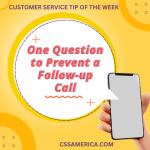If you are trying to figure out a Social Media Customer Service strategy, find some others already underway, and learn from what they do right (and wrong).
In the article “Mayor Lee Announces First of its Kind Facebook Application for City Services,” the City and County of San Francisco touts its new Facebook application that allows residents to submit requests through its site. Go to http://www.facebook.com/SF and click the SF311 Service Requests icon.
The organization is trying to accomplish 3 things: 1) Go to where the customers are located. 2) Learn more about the residents. 3) Save money.
Sure there are other goals, but this is what San Francisco’s government entities are trying to do – move you away from their 311 call center, engage more residents, and get information on you through your Facebook account.
Those are goals any business should have. Whether you are a pro sports team, a local municipality, an economic development agency, a college or university, or a bank, you need to be where your customers are, you need to engage them, and you need to bolster the intelligence you have on them. The strategy is all about relationship-development, retention, and financial improvement.
Learn a little strategy from this Facebook approach.
Read our New Book – “Ask Yourself…Am I GREAT at Customer Service?” http://www.amigreatat.com/
Interested in improving your company’s customer service? See more at our new website! http://www.cssamerica.com/





















